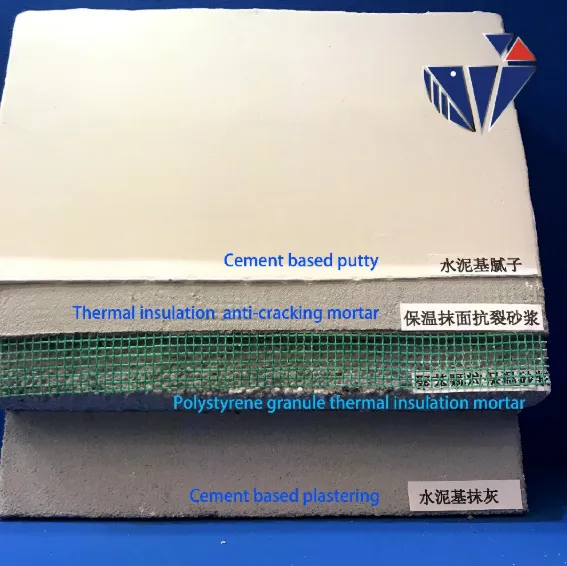
Pri . 02, 2025 11:53 Kthehu në listë
Guide to Mortar Bonding Agent
A mortar bonding agent is a specialized additive used to enhance adhesion, flexibility, and durability in cement-based mortars, plasters, and concrete applications. It improves bond strength between old and new concrete surfaces, enhances workability, and prevents cracking or delamination.

This article explores mortar bonding agents, key mortar adhesive additives, and where to find high-quality mortar bonding additives for construction projects.
What is a Mortar Bonding Agent?
A mortar bonding agent is a liquid or powder additive designed to increase the adhesion of mortar to various surfaces, including concrete, brick, tile, and masonry. These additives improve bonding performance, allowing the mortar to adhere more effectively to existing surfaces or dissimilar materials.
Common Types of Mortar Bonding Agents:
- Acrylic-Based Bonding Agents– Enhance adhesion, flexibility, and water resistance.
- Polyvinyl Acetate (PVA) Bonding Agents– Improve workability and bond strength for interior applications.
- Styrene-Butadiene (SBR) Latex Bonding Agents– Provide high durability, water resistance, and improved flexibility.
- Epoxy-Based Bonding Agents– Used for high-strength structural bonding in repairs and overlays.
Mortar Bonding Additive Uses
1. Concrete & Mortar Repairs
- Helps new mortar adhereto existing concrete or masonry surfaces.
- Prevents cracks, delamination, and poor adhesionin repair works.
2. Tile Adhesives & Grouts
- Improves bond strengthbetween mortar and tiles, stones, or flooring materials.
- Reduces shrinkage and water absorption, increasing long-term durability.
3. Plastering & Rendering
- Enhances adhesionbetween plaster layers and different substrates.
- Prevents peeling, flaking, and poor adhesionin wall coatings.
4. Self-Leveling Compounds & Underlayments
- Increases flowability and bonding strengthof self-leveling cement.
- Ensures a smooth, uniform surfacewith improved tensile strength.
5. Waterproofing & Crack Prevention
- Reduces porosityin mortar, making it water-resistant.
- Prevents hairline crackscaused by shrinkage and movement.
Best Mortar Bonding Additives & Adhesives
1. Acrylic-Based Bonding Agents
- Used for concrete repairs, tile adhesives, and rendering applications.
- Offers high adhesion, improved workability, and water resistance.
2. SBR (Styrene-Butadiene Rubber) Latex Additives
- Provides elasticity, durability, and weather resistance.
- Ideal for plaster, floor leveling, and waterproofing applications.
3. PVA (Polyvinyl Acetate) Adhesive Additives
- Suitable for interior mortar applicationswhere high bonding is required.
- Improves workability and reduces shrinkage.
4. Epoxy-Based Bonding Agents
- High-strength bonding for structural repairs and overlays.
- Used in industrial flooring, bridges, and heavy-duty construction.
How to Choose the Right Mortar Bonding Agent?
1. Identify Application Needs
- For concrete repair→ Use epoxy or acrylic-based bonding agents.
- For waterproofing→ Choose SBR latex additives.
- For tile adhesives→ Use polymer-modified bonding additives.
2. Check Compatibility with Mortar Type
- Some bonding agents work best with Portland cement-basedmortars, while others suit gypsum-based or polymer-modified.
3. Consider Performance Requirements
- Flexibility & Durability– Choose SBR-based
- Fast Setting & High Strength– Use epoxy-based bonding agents.
4. Verify Supplier & Quality Certifications
- Look forISO-certified suppliers with consistent quality control.
- Ensure compliance with ASTM C1059, EN 12004, or other industry standards.
Mortar Bonding Agent FAQs
1. What is a mortar bonding agent used for?
A mortar bonding agent enhances adhesion, flexibility, and durability in cement-based mortars, tile adhesives, and repair applications. It prevents cracking, shrinkage, and delamination in construction materials.
2. How does a mortar bonding additive improve adhesion?
Bonding additives modify mortar’s surface tension, allowing better penetration into substrates like concrete, tile, and masonry. They form a polymer film that increases bond strength and moisture retention.
3. What is the best mortar bonding agent for waterproofing?
SBR latex-based bonding agents provide excellent water resistance, flexibility, and adhesion, making them ideal for waterproofing applications.
4. Can I add PVA to mortar for better adhesion?
Yes, PVA (Polyvinyl Acetate) can be used in interior applications, but it is not recommended for exterior or high-moisture environments. SBR or acrylic-based additives offer better durability.
5. What is the difference between a bonding agent and a primer?
- Bonding Agents→ Improve adhesion between new and old mortar layers.
- Primers→ Prepare surfaces for better absorption before applying coatings or adhesives.
A mortar bonding agent is a key additive in construction, enhancing adhesion, flexibility, and durability in cement-based mortars, tile adhesives, plasters, and waterproofing applications.
When selecting mortar adhesive additives, consider factors like polymer type, compatibility with mortar, and supplier quality. Leading manufacturers provide high-performance bonding agents for construction and repair projects.
For bulk purchases, working with trusted suppliers ensures cost-effectiveness and consistent quality in large-scale applications.
-
Versatile Hpmc Uses in Different Industries
LajmeJun.19,2025
-
Redispersible Powder's Role in Enhancing Durability of Construction Products
LajmeJun.19,2025
-
Hydroxyethyl Cellulose Applications Driving Green Industrial Processes
LajmeJun.19,2025
-
Exploring Different Redispersible Polymer Powder
LajmeJun.19,2025
-
Choosing the Right Mortar Bonding Agent
LajmeJun.19,2025
-
Applications and Significance of China Hpmc in Modern Industries
LajmeJun.19,2025







